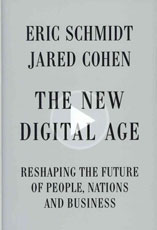"The Internet is among the few things humans have built that they don't truly understand. What began as a means of electronic information transmission — room-sized computer to room-sized computer — has transformed into an omnipresent and endlessly multifaceted outlet for human energy and expression. It is at once intangible and in a constant state of mutation, growing larger and more complex with each passing second. It is a source for tremendous good and potentially dreadful evil, and we're only just beginning to witness its impact on the world stage.
The Internet is the largest experiment involving anarchy in history. Hundreds of millions of people are, each minute, creating and consuming an untold amount of digital content in an online world that is not truly bound by terrestrial laws. This new capacity for free expression and free movement of information has generated the rich virtual landscape we know today. Think of all the websites you've ever visited, all the e-mails you've sent and stories you've read online, all the facts you've learned and fictions you've encountered and debunked. Think of every relationship forged, every journey planned, every job found and every dream born, nurtured and implemented through this platform. Consider too what the lack of top-down control allows: the online scams, the bullying campaigns, the hate-group websites and the terrorist chat rooms. This is the Internet, the world's largest ungoverned space.
"As this space grows larger, our understanding of nearly every aspect of life will change, from the minutiae of our daily lives to more fundamental questions about identity, relationships and even our own security. Through the power of technology, age-old obstacles to human interaction, like geography, language and limited information, are falling and a new wave of human creativity and potential is rising. Mass adoption of the Internet is driving one of the most exciting social, cultural and political transformations in history, and unlike earlier periods of change, this time the effects are fully global. Never before in history have so many people, from so many places, had so much power at their fingertips. And while this is hardly the first technology revolution in our history, it is the first that will make it possible for almost everybody to own, develop and disseminate real-time content without having to rely on intermediaries.
"And we've barely left the starting blocks.
"The proliferation of communication technologies has advanced at an unprecedented speed. In the first decade of the twenty-first century the number of people connected to the Internet worldwide increased from 350 million to more than 2 billion. In the same period, the number of mobile-phone subscribers rose from 750 million to well over 5 billion (it is now over 6 billion). Adoption of these technologies is spreading to the farthest reaches of the planet, and, in some parts of the world, at an accelerating rate.
"By 2025, the majority of the world's population will, in one generation, have gone from having virtually no access to unfiltered information to accessing all of the world's information through a device that fits in the palm of the hand. If the current pace of technological innovation is maintained, most of the projected eight billion people on Earth will be online.
"At every level of society, connectivity will continue to become more affordable and practical in substantial ways. People will have access to ubiquitous wireless Internet networks that are many times cheaper than they are now. We'll be more efficient, more productive and more creative. In the developing world, public wireless hot spots and high-speed home networks will reinforce each other, extending the online experience to places where people today don't even have landline phones. Societies will leapfrog an entire generation of technology. Eventually, the accoutrements of technologies we marvel at today will be sold in flea markets as antiques, like rotary phones before them.
"And as adoption of these tools increases, so too will their speed and computing power. Moore's Law, the rule of thumb in the technology industry, tells us that processor chips — the small circuit boards that form the backbone of every computing device — double in speed every eighteen months. That means a computer in 2025 will be sixty-four times faster than it is in 2013. Another predictive law, this one of photonics (regarding the transmission of information), tells us that the amount of data coming out of fiber-optic cables, the fastest form of connectivity, doubles roughly every nine months. Even if these laws have natural limits, the promise of exponential growth unleashes possibilities in graphics and virtual reality that will make the online experience as real as real life, or perhaps even better. Imagine having the holodeck from the world of Star Trek, which was a fully immersive virtual-reality environment for those aboard a ship, but this one is able to both project a beach landscape and re-create a famous Elvis Presley performance in front of your eyes. Indeed, the next moments in our technological evolution promise to turn a host of popular science-fiction concepts into science facts: driverless cars, thought-controlled robotic motion, artificial intelligence (AI) and fully integrated augmented reality, which promises a visual overlay of digital information onto our physical environment. Such developments will join with and enhance elements of our natural world.
"This is our future, and these remarkable things are already beginning to take shape. That is what makes working in the technology industry so exciting today. It's not just because we have a chance to invent and build amazing new devices or because of the scale of technological and intellectual challenges we will try to conquer; it's because of what these developments will mean for the world."
